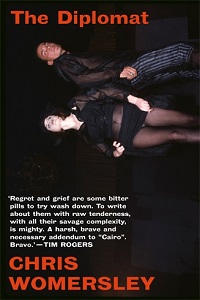
Title: The Diplomat
Author: Chris Womersley
Pages: 204
Published Date: 28 June 2022
Publisher: Picador Australia
Series Details: sequel to Cairo
Publisher's Synopsis
1991. Fresh out of detox and five years after his involvement in the theft of Picasso's masterpiece The Weeping Woman from the NGV, Edward Degraves - art forger and drug addict - returns to Melbourne for a new start. All he needs to do is make one last visit to The Diplomat, a seedy motel renowned for its drug dealers and eccentrics.
But Edward's new-found sobriety is both a torment and a gift. As he revisits old haunts, he is confronted by reminders of the past: ruined relationships, a stalled career as an artist and - looming over everything - the death of his beloved wife Gertrude.
Shot through with grief and dark comedy, The Diplomat is a powerful story of love and recovery - and a stark evocation of the fine line between self-destruction and redemption.
My Review
When I finished Chris Womersley’s novel Cairo, I was a little flat with the feeling that there were some details missing. To be precise, the fate of the art forgers, Edward and Gertrude, who disappeared (along with the money) as soon as it was safe to travel. The Diplomat fills that gap quite admirably with a heart-rending story of homecoming.
Taking up the thread of where Cairo left off, the Diplomat covers off in a succinct summary where each of the main players of the earlier heist wound up. It was done in a way that enables the book to be treated as its own stand-alone story yet still providing details that those of who were already invested craved.
Edward Degraves, one of the crew who fled to Europe after being part of the theft and forgery of Picasso’s The Weeping Woman, has returned after 5 years abroad. His wife, and forger, Gertrude, has died from a drug overdose and now Edward is looking to make a fresh start.
To fund that fresh start, he has brought with him a stash of heroin. This is the last of the assets that he and Gertrude earned from their forgery activities and if he can make a sale, he should be able to set himself up for the foreseeable future.
The Diplomat Motel is described as a ‘grungy motel in Acland Street favoured by touring rock bands at the cult end of their careers and tourists who hadn’t done their due diligence’.
This is the agreed upon place where Edward wants to offload his smuggled stash of heroin.
But the heroin sale is merely a sideline to the main event in which Edward operates. He is constantly weighed down by grief and bombarded by moments of self-reproach and through this he proceeds to visit various members of his family. Each of these visits is more awkward and confronting than the last.
The Diplomat is very much a companion piece to the early novel, Cairo. I feel that you will get more out of this book if you had read Cairo beforehand (well worth the read, by the way). The roles played by Edward and Gertrude in the heist can only truly be appreciated through the full experience of the earlier book.
Otherwise, I can understand readers wondering what the fuss is about and why they should care the slightest in Edward and Gertrude’s fate.
That’s not to say this isn’t a solid story filled with regret and self-recrimination, it’s all of that. But everything is put into a far more meaningful context if you have experienced the 5 year old heist firsthand.
There is a sense of a hangover feel about The Diplomat. Whereas Cairo was charged with the excitement of the art heist and the promise of the life that may come after, in The Diplomat we are treated to the result of reality and the cost of rampant drug use.
We also dig deeply into artistic talent, particularly unappreciated artistic talent and the effects it may have on the mind of the artist.
The Diplomat is bleak as it lays bare human frailty. There is an unmistakable sense of the lurking spectre of the piper who is waiting to be paid his terrible toll. For all the pain of loss and growing sense of futility, I enjoyed the richly descriptive nature of Chris Womersley’s writing.
